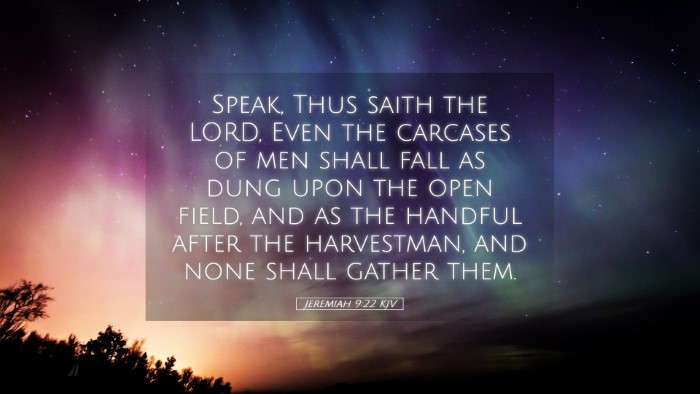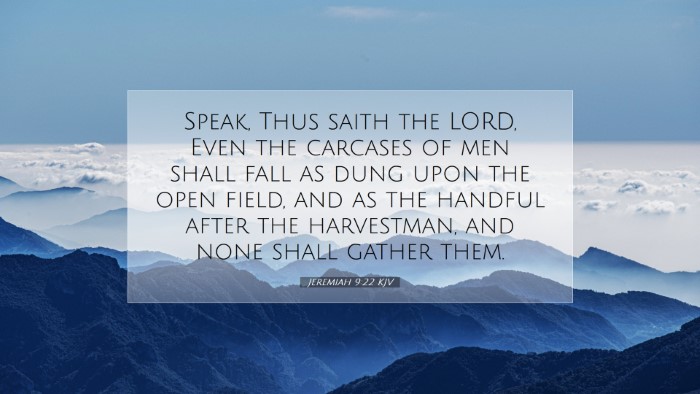Commentary on Jeremiah 9:22
In the context of the Book of Jeremiah, Chapter 9 verse 22 serves as a poignant reminder of the fate of Judah and the profound moral decay of its people. The verse reads:
"Let not the wise man glory in his wisdom, neither let the mighty man glory in his might, let not the rich man glory in his riches."
Exegesis of the Verse
This verse conveys a stark warning against pride in human achievements and possessions. The prophet Jeremiah calls attention to three types of earthly glory: wisdom, might, and riches. Each of these qualities or resources can lead to self-sufficiency and a detachment from reliance on God.
Insights from Matthew Henry
Henry's commentary emphasizes the futility of finding security in worldly accomplishments. He argues that:
- Wisdom: Human wisdom can be pitted against divine wisdom, which alone can guide and save.
- Might: Physical strength and military power are insufficient against God’s eternal purposes.
- Riches: Material wealth is temporary and cannot secure one’s standing before God.
In a detailed exploration, Henry reflects that the Lord desires that humans seek Him rather than elevate themselves through their own accomplishments. True glory comes from understanding and knowing God.
Reflections from Albert Barnes
Barnes provides a detailed interpretation that builds on the theme of human pride. He notes that:
- Those who boast in their wisdom often lack true understanding, which is found only in God.
- Strength and power are fleeting; what appears formidable can quickly falter.
- Riches may offer temporary comfort but cannot provide eternal security or fulfillment.
Barnes highlights the ultimate message that reliance on God is essential for a fulfilling and stable life. By warning against boasting, Barnes calls humanity to humility and dependence on divine providence.
Thoughts from Adam Clarke
Clarke expands upon the idea of transient authority and status by illustrating:
- The wise may fall into despair without acknowledging God as the source of true wisdom.
- The mighty, regardless of their strength, are powerless against the sovereign will of God.
- Those who trust in wealth ignore the moral and spiritual bankruptcy that often accompanies rich living.
Clarke's commentary urges believers to redirect their focus from temporal glory to eternal values. He posits that embracing humility and recognizing one’s limitations before God is essential for righteous living.
Thematic Considerations
This verse raises critical themes relevant for contemporary application:
- Humility: A recurring theme in scripture, this passage encourages readers to approach God with a humble heart.
- Dependence: Trusting in God rather than one’s personal achievements can lead to true wisdom and strength.
- Eternal vs. Temporal: The contrast between earthly accomplishments and spiritual realities urges a re-evaluation of what is truly valuable.
Conclusion
Jeremiah 9:22 serves as a counter-narrative to societal standards that often celebrate intellectualism, physical prowess, and wealth. Public domain commentaries by Matthew Henry, Albert Barnes, and Adam Clarke collectively illustrate that God desires a deeper relationship with His people based on humility and understanding.
In an age that values independence and self-reliance, this passage challenges believers to recognize that all wisdom, strength, and wealth come from God. The truth of God's sovereignty is paramount, and it is His knowledge, might, and provision that are worthy of glory and exaltation.


